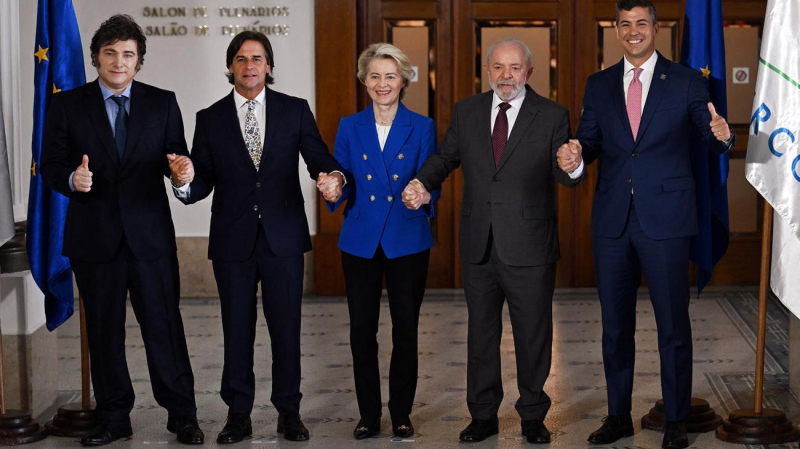
EITAN ABRAMOVICH AFP Von der Leyen and the presidents of Mercosur Friday, December 6
Mercosur and the EU concluded Friday in Montevideo “negotiations for a free trade agreement” to which Several European countries, led by France, are opposed, considering that “this only commits” the European Commission. It is now up to the member countries to ratify the treaty.
“This is the beginning of a new story” with “a deal that will benefit both” parties and “will bring significant benefits to consumers and businesses” if approved, said European Commission President Ursula von der Leyen. Saying that “the concerns of our farmers” had been listened to and that “this deal includes strong safeguards to protect our livelihoods,” she celebrated the draft treaty reached after 25 years of talks with the presidents of Argentina, Brazil, Paraguay and Uruguay.
But for France, leader of the countries opposed to this agreement in the name of defending the agricultural world and which demands from Mercosur the same environmental and health standards in force in the EU to avoid “unfair competition”, the agreement “remains unacceptable as it stands”.
“The Commission has completed its negotiation work with Mercosur, that is its responsibility, but the agreement has neither been signed nor ratified. So this is not the end of the story. There is no entry into force of the agreement with Mercosur”, stressed the Elysée during an exchange with journalists.
“There is therefore no legal effect and the States are not bound by the announcement of the end of negotiations”, specified a presidential adviser, while the agricultural unions and opposition parties have all denounced the conclusion of the negotiations.
Rural Coordination and the French majority agricultural union alliance FNSEA-Jeunes agriculteurs (JA) have stepped up their protest actions in recent weeks, pointing to “a provocation for European farmers who apply the highest production standards in the world”.
The European organisation of the majority agricultural unions, Copa-Cogeca, calls on “the Member States and the European Parliament to mobilise against this agreement”.
– “Historic agreement” –
The draft treaty, which has been under discussion since 1999, aims to eliminate the majority of customs duties between the European Union and Mercosur in order to create a vast market of more than 700 million consumers, the “largest trade and investment partnership ever seen,” according to Ms. von der Leyen.
The deal would make it easier for the EU, already Mercosur's largest trading partner, to export its cars, machinery and pharmaceutical products. On the other hand, it would allow the South American countries concerned to sell meat, sugar, rice, honey and soya to Europe, at the expense of our farmers.
German Chancellor Olaf Scholz, keen to open up new markets for his country's flagging industry, is expecting “more growth and competitiveness”.
Spanish Prime Minister Pedro Sanchez is delighted with a “historic agreement” with “brother countries in Latin America”.
Greenpeace considers such a free trade agreement to be “toxic” and denounces “twenty-five years of secret discussions behind closed doors” which have “resulted in a consensus that will increase trade in meat, pesticides and plastics, with disastrous impacts on the Amazon, the climate and human rights.”
For Brazilian President Lula, on the contrary, it is a “modern and balanced text, which recognizes the environmental credentials of Mercosur and reinforces our commitment to the Paris Agreements on climate change.”
– Ratification –
While under the European treaties, the Commission is the sole negotiator of trade agreements on behalf of the Twenty-Seven, the agreement signed on Friday must still obtain ratification by winning the approval of at least 15 Member States representing 65% of the EU population, and then by gathering a majority in the European Parliament.
A blocking minority can also stop any ratification. This is now the fight that Emmanuel Macron has taken up, telling Ms von der Leyen that he intends to continue “to tirelessly defend our agricultural sovereignty”.
After Polish Prime Minister Donald Tusk said at the end of November that he would not accept the project “in this form”, Italy joined the French refusal front on Thursday, considering that “the conditions are not right to subscribe to the current text”.
And this declared trio is not alone, since Austria, the Netherlands and Ireland have already expressed reservations.
To prevent the adoption of the text, France needs to rally three other countries representing more than 35% of the EU population, a threshold that is easily crossed if the support of Rome and Warsaw is confirmed at the time of the vote.
You liked the article ? It mobilized our editorial staff who only live on your donations.
Information has a cost, especially since the competition from subsidized editorial staff requires increased rigor and professionalism.
With your support, France-Soir will continue to offer its articles free of charge because we believe that everyone should have access to free and independent information to form their own opinion.
You are the sine qua non condition for our existence, support us so that France-Soir remains the media French which allows the most legitimate to express themselves.
